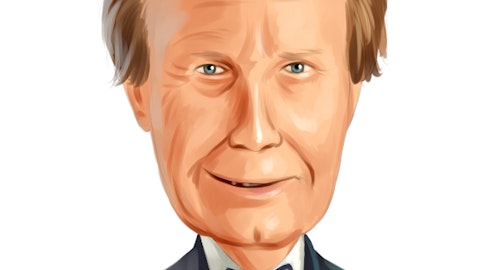Rell Winand: Yes, you have to — I think the 10-K, we have to ending this year. And then going forward, I believe it will all be one.
Shahram Askarpour: Believe it or not, the auditors are still working on it. So I never imagined it will be that hard.
Rell Winand: Everything is hard…
Andrew Rem: On R&D, can you guys maybe just give updated guidance. Last year, I think you guys said you wanted to kind of push R&D to kind of 13%, 14%. But given the Honeywell, it doesn’t sound like it will necessarily consume a lot of R&D resources. But can you maybe just reframe how you’re thinking about R&D?
Shahram Askarpour: So I guess 13% of [Indiscernible] million is still less than 10% of $40-odd million. So as a percentage of revenue, our R&D percentage is going to go down, which in terms of dollar value, increasing the size of our engineering department and using some of the revenues that come from these Honeywell products to further our internal growth strategy.
Rell Winand: So it will go higher in absolute terms. But as a percentage of sales growing, that’s going to be faster than the increase than you would see. So you’ll see that relationship go down.
Andrew Rem: And then also in the Q, will you guys break out some of these what sounds like kind of either short term or onetime related items, both in — I guess in the fourth quarter specifically?
Rell Winand: Well, it’s kind of what I said here, but yes, a little bit more detail. In the MD&A, the comparison, it will be addressed in there, yes.
Shahram Askarpour: I think the Q4 was just over $1 million of onetime expenses in this Q4…
Rell Winand: And so really if you look at it — as the difference, if you add $1.2 million back and look at it, that’s really the…
Shahram Askarpour: It’s $5 million. And I can imagine the quarter that we are in is not going to be any better either.
Rell Winand: It will be as high but it will be more than [Multiple Speakers]…
Andrew Rem: And then can you guys give an update in terms of on the integration kind of what have you completed and what is left to do?
Shahram Askarpour: So one of the product lines is completely here. We’ve got our people train and we are actually performing on, and that’s on the radio side. On the [IRU] side, we’re going to do that in — the transfer of all the equipment and the training and all of that, it’s going to occur after the holidays. And the reason for that is that, that product line is mainly for the air transport market. And the airlines were very nervous in doing that in November, December time period, because they felt that it may impact their busy period. So we work — our team works on a daily basis with the Honeywell integration team. And we evaluate each one of these requests from the customers on a daily basis to make sure there’s no disruptions in the operation.
Obviously, this slowdown that occurred during this quarter, because on the radio side when you think about it, they had to pack all of these test equipment, inventory then, make sure they were right, shift them here, unpack them here. There has to be a [Multiple Speakers] their team come here, make sure everything works, right. I’m doing — on the final stage of training to all people, during that period, nothing happens…
Rell Winand: Which is why the pull forward in Q4.
Shahram Askarpour: And the same thing is going to happen next quarter in the January to March quarter with the IRU stuff, where, again, they have to be act and set up over here, that’s the process.
Operator: Next question comes from Doug Ruth with Lenox Financial Services.
Doug Ruth: I have three questions. What is the company’s relationship now with the Hedrick family?
Shahram Askarpour: So they have the dependent trust that are managed by different people within the Hedrick’s family that each own some number of shares. And the state also owns some shares. But none of them are, I guess, significant enough to have reporting requirement on them, they’re below the threshold and they all managed by different people. So that’s the way it is.
Doug Ruth: So there’s no representation on the Board of Directors, and there’s not too much of a relationship with any family member at this point then?
Shahram Askarpour: No, Geoff passed already from the [Technical Difficulty] or be represented on the Board.
Doug Ruth: And then the second question is the relationship with the large shareholder, Christopher Herborne. Is he involved, is he asking for a Board seat or is there any interaction with the company and his entity?
Shahram Askarpour: No, it hasn’t [Technical Difficulty] business relationship with [Technical Difficulty] companies, whether supplier to it, but if we ever have any conversation it’s always regards to that business [Technical Difficulty].
Doug Ruth: And then the final question. Are the Board members and the management team, are you folks eligible to buy stock at this point in time or are you in a [blackout] period, maybe you could offer some advice there?


